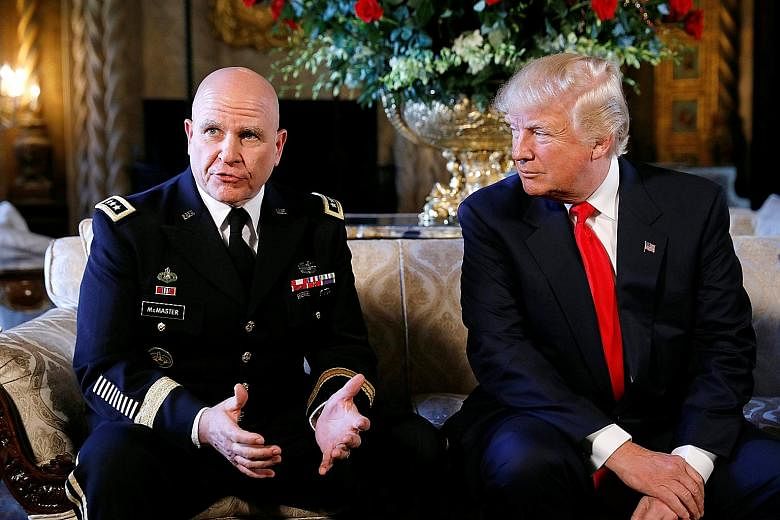Lieutenant-General H.R. McMaster made his name in the deserts of Iraq where he led 140 men and nine tanks into one of the last major tank battles of the 20th century, without losing a single soldier.
Now one of the US Army's most charismatic leaders is gearing up for what may prove to be a tougher assignment - suiting up for political combat as the new national security adviser in the tumultuous Trump White House.
Indeed, another army lieutenant-general, Michael Flynn, went down in flames in that post less than a month after his appointment when the fiery new US President asked him to resign, reputedly for not telling the truth over talks he had had with Russia's ambassador to the United States.
Lt-Gen McMaster, by contrast, has a reputation for telling it like it is. The 54-year-old graduate of West Point wrote Dereliction Of Duty, in which he pointedly blames the US defeat in Vietnam on the "lies", as he puts it right in the volume's subtitle, told by the military's Joint Chiefs of Staff of that war to president Lyndon Johnson, because they knew he did not want to hear that his strategy for winning the war was not working. As the Washington Post noted, Lt- Gen McMaster's "military career has been defined by such a willingness to dissent - often forcefully".
Ironically, his appointment has raised hopes for critics of the Donald Trump administration. National Public Radio's Tamara Keith said on her All Things Considered show that Dereliction Of Duty is essentially about generals who deferred to politicians - and regretted it. For that reason, Lt-Gen McMaster is not expected to back down if challenged by anyone in the White House. "He's his own man and will tell you exactly what he thinks," Ms Keith said.
Yet Lt-Gen McMaster was little known outside political and military circles before Time magazine named him one of its 100 most influential people in 2014. In an accompanying profile, another lieutenant- general, the retired Dave Barno, wrote that Lt-Gen McMaster "might be the 21st-century army's pre-eminent warrior-thinker" and "the rarest of soldiers - one who has repeatedly bucked the system and survived to join its senior ranks".
Born in Philadelphia, Herbert Raymond McMaster went straight from junior high school to the Valley Forge Military Academy. In 1984, he graduated from the US Military Academy, or West Point, earning a commission as a second lieutenant. He next earned a master's degree and a doctorate in American history from the University of North Carolina at Chapel Hill.
After military assignments in the US and Germany, Iraq - and Operation Desert Storm - beckoned in 1991. Then-Captain McMaster commanded the Eagle Troop of the 2nd Armoured Cavalry Regiment at the Battle of 73 Easting, on Feb 26, turning it into a touchstone of military strategy - and lore.
In less than half an hour in the midst of a blinding sandstorm, his small force destroyed more than 25 Iraqi tanks, 16 personnel carriers and 30 trucks in a move to outflank the much-larger enemy force, without suffering casualties. Military professors now often use commander McMaster's straggle as an example of modern tank tactics.
His time on the ground in Iraq and later Afghanistan means that Lt-Gen McMaster will bring first- hand knowledge of the Middle East to the White House. More importantly, his experiences there have shaped his views of Islam, one sharply different from that of his predecessor, and of Mr Stephen Bannon, another Trump adviser and former editor of the hard-right Breitbart website. The two men's influence in the White House already has many Muslims sensing an anti-Islam strain.
Mr Flynn and Mr Bannon have portrayed Islam as a political ideology at war with Western values. By contrast, Lt-Gen McMaster's close relationships with Muslims on the battlefields taught him that such hardcore views hurt rather than help the US cause there, as Mr Sterling Jensen, who was a translator in Iraq's Anbar province and worked closely with US officers in forging an alliance with sheikhs there against Al-Qaeda, told Bloomberg Views.
"Iraqis and Muslims won't see him as someone who hates Islam, even if the Trump administration is perceived that way," he said. "I have never heard him say anything against Islam. Being respectful is one of his defining characteristics."
Retired lieutenant-colonel John Nagl, who is noted for his books on counter-insurgency, told Bloomberg that Lt-Gen McMaster believes ideological purity hampers an effective campaign for the hearts and minds of fervent Muslims.
"H.R., like all of us, has shaken hands with Muslims who fought against Americans and killed Americans and switched sides to fight with us against Al-Qaeda," he said. "He understands that the world is not one-dimensional, that the Muslim world is not one-dimensional. Even people who are our enemies today may decide to fight on our side tomorrow."

